| Listing 1 - 10 of 16 | << page >> |
Sort by
|
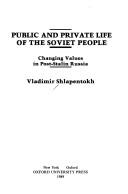
ISBN: 0195042662 Year: 1989 Publisher: New York (N.Y.) Oxford University Press
Abstract | Keywords | Export | Availability | Bookmark
 Loading...
Loading...Choose an application
- Reference Manager
- EndNote
- RefWorks (Direct export to RefWorks)
Book
ISBN: 0691094594 1306986214 0691602301 1400861136 9781400861132 0691631832 Year: 2014 Publisher: Princeton, NJ
Abstract | Keywords | Export | Availability | Bookmark
 Loading...
Loading...Choose an application
- Reference Manager
- EndNote
- RefWorks (Direct export to RefWorks)
In this unprecedented work on the status and role of intellectuals in Soviet political life, a former Soviet sociologist maps out the delicate, often paradoxical, ties between the political regime and the creative thinkers who play a major part in the movement toward modernization. Beginning with Stalin, Vladimir Shlapentokh explores the mutual need and antagonism that have existed between political leaders and intellectuals. What emerges is a fascinating portrayal of the Soviet intellectual network since the 1950s, which touches on such topics as the role of literature and film in political opposition, levels of opposition (open, legal, and private), and the spread of paranoia as fueled by the KGB. Throughout he shows how the intellectual communityusually a cohesive, liberal grouphas fared under Khrushchev's cautious tolerance, Brezhnev's repressions, and now Gorbachev's Glasnost.Shlapentokh maintains, however, that under Glasnost freer speech has revealed a more pronounced divergence between liberal and conservative thinkers, and has allowed for open conservative opposition to the reformatory measures of Gorbachev and the liberals. He argues that one of the strongest checks on reform is the growing presence of Russophilism--a movement supporting Russian nationalism and Stalin's concept of socialism--among the political elite and the masses. Although the role of the liberal intellectuals in the late 1980s was less prominent than it was in the 1960s, Shlapentokh asserts that they remain the major agent of modernization in the Soviet Union, as well as in other socialist countries.Originally published in 1990.The Princeton Legacy Library uses the latest print-on-demand technology to again make available previously out-of-print books from the distinguished backlist of Princeton University Press. These editions preserve the original texts of these important books while presenting them in durable paperback and hardcover editions. The goal of the Princeton Legacy Library is to vastly increase access to the rich scholarly heritage found in the thousands of books published by Princeton University Press since its founding in 1905.
Soviet Union -- Intellectual life. --- Soviet Union -- Politics and government -- 1953-1985. --- Soviet Union -- Politics and government -- 1985-1991. --- Soviet Union --- Intellectual life. --- Politics and government --- Intellectual life --- From 1917 --- 1953-1985 --- 1986 --- -Soviet Union - Intellectual life - 1917 --- -Soviet nion - Politics and government - 1953-1985. --- Soviet Union - Politics and government - 1986 --- -Soviet Union --- HISTORY / Russia & the Former Soviet Union. --- -HISTORY / Russia & the Former Soviet Union. --- Soviet Union - Intellectual life - 1917
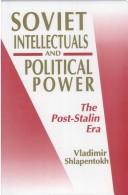
ISBN: 1850432848 Year: 1990 Publisher: London : Tauris,
Abstract | Keywords | Export | Availability | Bookmark
 Loading...
Loading...Choose an application
- Reference Manager
- EndNote
- RefWorks (Direct export to RefWorks)
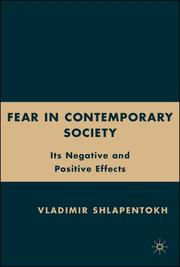
ISBN: 140397389X 9781403973894 Year: 2006 Publisher: New York (N.Y.) : Palgrave Macmillan,
Abstract | Keywords | Export | Availability | Bookmark
 Loading...
Loading...Choose an application
- Reference Manager
- EndNote
- RefWorks (Direct export to RefWorks)
Contemporary social science avoids the discussion of fear as a major element of social life and as a factor that shapes social order and the quality of life. The author wants to fill this lacuna. The fear of punishments for violating the laws imposed by the state and other social institutions, such as the family, public opinion, the church and others, are useful for the maintenance order in society. The author's views oppose the mainstream of American social science, which is hostile toward coercion and the state in general, and sees social order as based only on the allegiance of the individual to the dominant culture and self-regulation. Pointing to the flaws of these views, which are mostly based on the Lockean-Parsonian tradition, as well as on the postmodern perspective, the author proposes that the Hobbesian viewpoint be included in social analysis. He assumes that social order is shaped not only from & below,& but also from & above& with the state as a positive agent.
Fear. --- Social structure. --- Social values.
Book
ISBN: 0275925617 Year: 1986 Publisher: New York Praeger
Abstract | Keywords | Export | Availability | Bookmark
 Loading...
Loading...Choose an application
- Reference Manager
- EndNote
- RefWorks (Direct export to RefWorks)
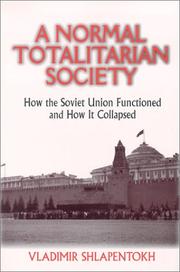
ISBN: 1563244721 Year: 2001 Publisher: Armonk (N.Y.) Sharpe
Abstract | Keywords | Export | Availability | Bookmark
 Loading...
Loading...Choose an application
- Reference Manager
- EndNote
- RefWorks (Direct export to RefWorks)
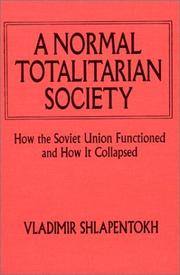
ISBN: 1563244713 Year: 2001 Publisher: Armonk, N.Y. Sharpe
Abstract | Keywords | Export | Availability | Bookmark
 Loading...
Loading...Choose an application
- Reference Manager
- EndNote
- RefWorks (Direct export to RefWorks)
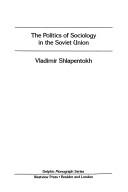
ISBN: 0813372593 Year: 1987 Publisher: Boulder Westview
Abstract | Keywords | Export | Availability | Bookmark
 Loading...
Loading...Choose an application
- Reference Manager
- EndNote
- RefWorks (Direct export to RefWorks)
Sociology --- Sociology --- Political aspects --- Soviet Union --- Politics and government.
Book
ISBN: 9781107042148 9781107323780 9781461945222 1461945224 1107323789 9781107465398 1107465397 1107042143 1139893491 9781139893497 1107459729 9781107459724 1316609332 9781316609330 1107472547 9781107472549 1107468949 9781107468948 1107473527 9781107473522 110746188X 1306072352 Year: 2013 Publisher: New York, NY
Abstract | Keywords | Export | Availability | Bookmark
 Loading...
Loading...Choose an application
- Reference Manager
- EndNote
- RefWorks (Direct export to RefWorks)
This study demonstrates how the emergence of private property and a market economy after the Soviet Union's collapse enabled a degree of freedom while simultaneously supporting authoritarianism. Based on case studies, Vladimir Shlapentokh and Anna Arutunyan analyze how private property and free markets spawn feudal elements in society. These elements are so strong in post-Communist Russia that they prevent the formation of a true democratic society, while making it impossible to return to totalitarianism. The authors describe the resulting Russian society as having three types of social organization: authoritarian, feudal and liberal. The authors examine the adaptation of Soviet-era institutions like security forces, the police and the army to free market conditions and how they generated corruption; the belief that the KGB was relatively free from corruption; how large property holdings merge with power and necessitate repression; and how property relations affect government management and suppression.
Democracy --- Civil rights --- Property --- Free enterprise --- Political aspects --- Russia (Federation) --- Politics and government --- RUSSIA [FEDERATION] -- 330.17 --- FREE ENTERPRISE -- 325.9 --- Free markets --- Laissez-faire --- Markets, Free --- Private enterprise --- Economic policy --- Economics --- Possession (Law) --- Things (Law) --- Wealth --- Self-government --- Political science --- Equality --- Representative government and representation --- Republics --- Law and legislation --- Primitive property --- Social Sciences --- Political Science --- Democracy - Russia (Federation) --- Civil rights - Russia (Federation) --- Property - Political aspects - Russia (Federation) --- Free enterprise - Political aspects - Russia (Federation) --- Russia (Federation) - Politics and government - 1991 --- -Democracy
Book
ISBN: 9780271056746 9780271075020 0271056746 9780271055350 0271055359 0271037822 9780271037820 027105588X 9780271055886 9780271037813 0271037814 9780271037820 9780271055886 9780271053653 0271053658 0271075023 Year: 2011 Publisher: University Park, Pa. Pennsylvania State University Press
Abstract | Keywords | Export | Availability | Bookmark
 Loading...
Loading...Choose an application
- Reference Manager
- EndNote
- RefWorks (Direct export to RefWorks)
Do Americans live in a liberal capitalist society, where evenhanded competition rules the day, or a society in which big money, private security, and personal relations determine key social outcomes? Vladimir Shlapentokh and Joshua Woods argue that the answer to these questions cannot be found among the conventional models used to describe the nation. Offering a new analytical tool, the authors present a provocative explanation of the nature of contemporary society by comparing its essential characteristics to those of medieval European societies. Their feudal model emphasizes five elements: the weakness of the state and its inability to protect its territory, guarantee the security of its citizens, and enforce laws; conflicts and collusions between and within organizations that involve corruption and other forms of illegal or semilegal actions; the dominance of personal relations in political and economic life; the prevalence of an elitist ideology; and the use of private agents and organizations for the provision of safety and security. Feudal America urges readers to suspend their forward-thinking and futurist orientations, question linear notions of social and historical progression, and look for explanations of contemporary social problems in medieval European history.
SOCIAL SCIENCE / Sociology / General. --- United States --- Social conditions --- Economic conditions --- Politics and government --- Sociology. --- United States -- Economic conditions -- 21st century. --- United States -- Politics and government -- 21st century. --- United States -- Social conditions -- 21st century.
| Listing 1 - 10 of 16 | << page >> |
Sort by
|

 Search
Search Feedback
Feedback About UniCat
About UniCat  Help
Help News
News